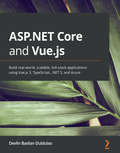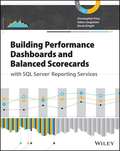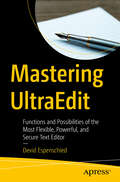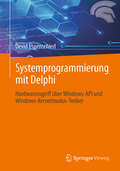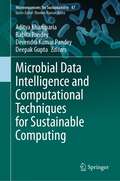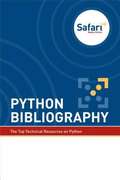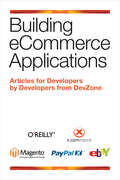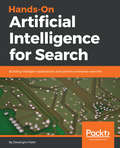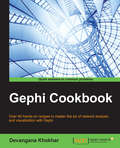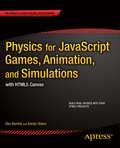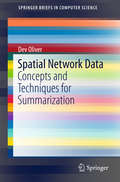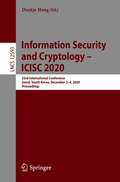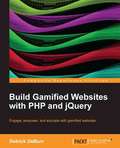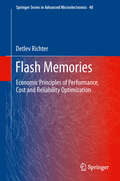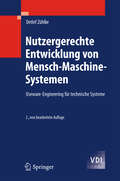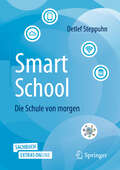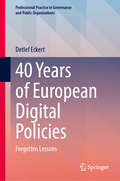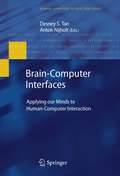- Table View
- List View
ASP.NET Core and Vue.js: Build real-world, scalable, full-stack applications using Vue.js 3, TypeScript, .NET 5, and Azure
by Devlin Basilan DuldulaoA guide to building enterprise, cloud-ready full-stack web applications using TypeScript, Vue.js 3, and ASP.NET Core 5 for busy developersKey FeaturesLearn how to implement clean architecture in the latest ASP.NET Core 5 Web APIDevelop Vue.js 3 single-page applications (SPAs) using TypeScript or JavaScript programming and Vuex state managementSecure, test, and deploy your full-stack web application to Azure CloudBook DescriptionVue.js 3 is faster and smaller than the previous version, and TypeScript's full support out of the box makes it a more maintainable and easier-to-use version of Vue.js. Then, there's ASP.NET Core 5, which is the fastest .NET web framework today. Together, Vue.js for the frontend and ASP.NET Core 5 for the backend make a powerful combination. This book follows a hands-on approach to implementing practical methodologies for building robust applications using ASP.NET Core 5 and Vue.js 3. The topics here are not deep dive and the book is intended for busy .NET developers who have limited time and want a quick implementation of a clean architecture with popular libraries. You'll start by setting up your web app's backend, guided by clean architecture, command query responsibility segregation (CQRS), mediator pattern, and Entity Framework Core 5. The book then shows you how to build the frontend application using best practices, state management with Vuex, Vuetify UI component libraries, Vuelidate for input validations, lazy loading with Vue Router, and JWT authentication. Later, you'll focus on testing and deployment. All the tutorials in this book support Windows 10, macOS, and Linux users. By the end of this book, you'll be able to build an enterprise full-stack web app, use the most common npm packages for Vue.js and NuGet packages for ASP.NET Core, and deploy Vue.js and ASP.NET Core to Azure App Service using GitHub Actions.What you will learnDiscover CQRS and mediator pattern in the ASP.NET Core 5 Web APIUse Serilog, MediatR, FluentValidation, and Redis in ASP.NETExplore common Vue.js packages such as Vuelidate, Vuetify, and VuexManage complex app states using the Vuex state management libraryWrite integration tests in ASP.NET Core using xUnit and FluentAssertionsDeploy your app to Microsoft Azure using the new GitHub Actions for continuous integration and continuous deployment (CI/CD)Who this book is forThis app development book is for .NET developers who want to get started with Vue.js and build full-stack real-world enterprise web applications. Developers looking to build a proof-of-concept application quickly and pragmatically using their existing knowledge of ASP.NET Core as well as developers who want to write readable and maintainable code using TypeScript and the C# programming language will also find this book useful. The book assumes intermediate-level .NET knowledge along with an understanding of C# programming, JavaScript, and ECMAScript.
Building Performance Dashboards and Balanced Scorecards with SQL Server Reporting Services
by Christopher Price Devin Knight Adam JorgensenDiscover how to maintain and update balanced scorecards and performance dashboards with SQL Server Reporting Services Complementing the bestselling Balanced Scorecards and Operational Dashboards with Microsoft Excel (9780470386811), this indispensable book shows you how to create maintainable and dynamically updated scorecards and performance dashboards using Microsoft's premier reporting tool for the enterprise: SQL Server Reporting Services. The book begins with coverage of performance management methods and metrics and then moves on to introduce you to techniques for developing and delivering both a dashboard and balanced scorecard using Reporting Services. The authors assume very limited knowledge of Reporting Services, allowing you to gradually progress through more advanced topics and solutions. Shows you how to build a simple dashboard and balanced scorecard utilizing helpful examples Discusses formatting controls and labels, paging, and conditional formatting Introduces the skills necessary to make Reporting Services dashboards and scorecards interactive Covers the visual aspect of dashboards and scorecards and shows how to design and implement dashboards and scorecards in Reporting Services for mobile devices Explains how to apply the techniques covered earlier in the book for specific business applications This book sets itself apart from other titles with its comprehensive and invaluable coverage of key strategies and techniques for effectively using SQL Reporting Services to create scorecards and dashboards.
Attack from Tilted Towers: An Unofficial Novel of Fortnite (Trapped In Battle Royale)
by Devin HunterWith Tae Min’s help, Grey’s squad reaches the top ten, but every game changes who will stay trapped in Fortnite Battle Royale and who will go home. There are only three days of battles left, and Grey isn’t sure it’s enough to secure top five for his whole squad. His rank is higher than his friends, and it starts to look like he’ll get home like he wanted. But someone he cares about will have to stay, and Grey has to make a choice: give up his spot or leave his friends. Either choice will mean losing something, but Grey must decide if what’s gained is worth more.
Battle for Loot Lake: An Unofficial Fortnite Novel (Trapped In Battle Royale #2)
by Devin HunterTwelve-year-old Grey has been sucked into a hacked, virtual reality version of Fortnite Battle Royale along with one hundred other players. To get home, he must become one of the top five players before the season ends, or he’s stuck in Fortnite for another two months. Grey and his friend have gone up in ranks and are learning how to build structures to improve their tactics. While they’re not at the top by any means, they are solidly in the middle of the pack. They aspire to be like the Top Player, who has been unbeatable for fifteen games in a row. No one knows how the Top Player does it, but everyone is chasing him. Before Grey can aspire to beat the Top Player, though, he has to get through the Rival players that are just above him. These players are threatened by him and his friend and hunt them down in every battle. Grey wants to beat them, but he can’t figure out how. How can Grey survive long enough to beat the Top Player? And will he ever escape the Fortnite world?
Betrayal at Salty Springs: An Unofficial Fortnite Novel (Trapped In Battle Royale #3)
by Devin HunterGrey has improved a ton with the help of his friends, and he’s closing in on the top tier of players. But then his closest friend announces that he’s been asked to join a new squad on the top tier and leaves them in hopes of making the top five with his new squad. Grey is devastated, and their play struggles. He falls back several ranks and begins to wonder if it’s even possible to escape the game this season. Some players have been there for many seasons…some aren’t even trying to leave because they like it so much. Maybe he should just accept it as his life. A former rival tells him to snap out of it—he’s too good to slide back so far. They end up in a squad and do well enough to scale the ranks again. Grey has a chance to screw over his old Ally/Friend by taking his place on the Top Tier team, but will he?
Clash At Fatal Fields: An Unofficial Fortnite Novel (Trapped In Battle Royale)
by Devin HunterTwelve-year-old Grey gets sucked into a hacked, virtual reality version of Fortnite Battle Royale along with one hundred other players. To get home, he must become one of the top five players before the season ends, or he’s stuck in Fortnite for another two months. <P><P>Grey logs into Battle Royale as usual, but unlike before he passes out and wakes up in the lobby and everything is as real as can be. Four others stand there with him as an admin tells them they are the “new meat” and their game has been hacked. Their consciousness will be trapped in this version of Fortnite until they can become the top five players for a season. <P><P>New to the fighting arena but ambitious, Grey sets out for glory with one hundred other players on a flying bus. As they jump and land on the island to battle, he struggles to figure out the tools as people come to kill him. He dies quickly, much to his disappointment. Maybe this won’t be as easy as he thought. <P><P>While waiting for the next game in the lobby, someone gives him some tips to help him out and he fares a bit better. They form a duo in hopes of both escaping the game together. Will Grey be able to escape, now that he has an ally?
Fight for Dusty Divot: An Unofficial Fortnite Novel (Trapped In Battle Royale #5)
by Devin HunterTime is running out for Grey and his squad. While they consistently rank in the top twenty players stuck in Fortnite Battle Royale, they need to be the top five to escape virtual reality and go home. Grey’s team begins to fray apart, and he fears he won’t be able to keep them together long enough to get the rank they need. With the season ending in a couple weeks, people are either giving up or fighting harder than ever. When Grey losses another squad member, he’s on the verge of throwing in the towel himself. But to his surprise, the top player, Tae Min, approaches him with a deal that may give them just the chance they need.
The Squad of Lucky Landing: An Unofficial Fortnite Novel (Trapped In Battle Royale)
by Devin HunterGrey never expected his best friend, Finn, to end up trapped in Battle Royale as well, but now they both have to fight to get out. And there are only a few more weeks to do it. If Ben and Tristan hadn’t left Grey’s squad, he would have been a lot closer to the top five. But with the help of his new squad members, Grey is determined to climb back to the top. It won’t be easy when Grey’s old squad mates use his own tactics against him. He must use his creativity to find new ways to lead his squad back to the top twenty.
Mastering UltraEdit: Functions and Possibilities of the Most Flexible, Powerful, and Secure Text Editor
by Devid EspenschiedThis guide to UltraEdit covers the text editor's powerful and flexible functions that go far beyond the functionality of a normal text editor for a breadth of use cases, including text/code editing, web development, system administration, development/programming, remote file editing, data filtering and sorting, and file compare. Even though UltraEdit celebrated its 30th anniversary in 2024, very few manuals exist. This book provides a well-founded introduction and exhaustively discusses all UltraEdit’s powerful functions. At the same time, the book is intended to be a solid reference and a bundled compendium for the more than four million UltraEdit customers worldwide. What You Will Learn Know the basic functions and many power functions Understand the focus of UltraEdit in the areas of programming/development, web development, database management, and system administration, as well as technical writing, editing, and publishing Get up to speed on functions and capabilities, user interface and program navigation, customization and settings, and windows arrangement and file management Know the core functions for editing and inserting data Expand your knowledge with the many view variations, formatting options, and powerful search and replace features an editor can include Perfect your workflow with many other power functions such as multi-caret editing, column mode, and FTP integration Who This Book Is For Users who are familiar with text editors but are frustrated with their limits, or who want to benefit from UltraEdit's long-established power functions
Systemprogrammierung mit Delphi: Hardwarezugriff über Windows-API und Windows-Kernelmodus-Treiber
by Devid EspenschiedWährend ständig neue Technologien und Schnittstellen die Softwareentwicklung mit Delphi begleiten, führt Sie dieses Buch in die Systemprogrammierung ein, die auch heute noch einen häufig unterschätzten Stellenwert hat. Systemprogrammierung kann sehr komplex sein und setzt fortgeschrittene Kenntnisse voraus. Mit der richtigen Methodik lässt sich das System besser beherrschen und ein besseres Systemverständnis erreichen. Dadurch sind viele Systeminformationen fundierter und umfassender ermittelbar,als es mit Windows-Bordmitteln möglich wäre. Nach einer Einführung in die Systemprogrammierung und Windows-Architektur werden Delphi-Zugriffe auf API, WMI, Registrierung, SMBIOS und Prozessor ausführlich besprochen. Weiterhin erfolgt die Entwicklung eines Windows-Kernelmodus-Treibers mit Microsoft Visual Studio, der auch unter Windows den Hardwarezugriff ermöglicht. Darauf aufbauend wird eine Beispielanwendung entworfen, die u.a. präzise Angaben zu Prozessoren mitsamt deren Temperatursensoren, Speichermodulen und PCI-Geräten bietet – ideal als praxisnahe Ergänzung zu den theoretischen Inhalten.
Microbial Data Intelligence and Computational Techniques for Sustainable Computing (Microorganisms for Sustainability #47)
by Deepak Gupta Aditya Khamparia Babita Pandey Devendra Kumar PandeyThis book offers information on intelligent and computational techniques for microbial data associated with plant microbes, human microbes etc. The main focus of this book is to provide an insight on building smart sustainable solutions for microbial technology using intelligent computational techniques. Microbes are ubiquitous in nature, and their interactions among each other are important for colonizing diverse habitats. The core idea of sustainable computing is to deploy algorithms, models, policies and protocols to improve energy efficiency and management of resources, enhancing ecological balance, biological sustenance and other services on societal contexts. Chapters in this book explore the conventional methods as well as the most recently recognized high-throughput technologies which are important for productive agroecosystems to feed the growing global population. This book is of interest to teachers, researchers, microbiologist, computer bioinformatics scientists,plant and environmental scientist, and those interested in environment stewardship around the world. The book also serves as an advanced textbook material for undergraduate and graduate students of computer science, biomedicine, agriculture, human science, forestry, ecology, soil science, and environmental sciences and policy makers.
Python Bibliography
by Developers From DevzoneTwenty years ago, Guido van Rossum was hard at work on the first release of Python. A lot has changed in those twenty years. Many of the programming languages that were contemporaries of Python have started showing their age. Meanwhile, there have been no shortages of new programming languages, yet Python continues to hold up well. Its emphasis on clean syntax, and its melding of object-oriented and functional programming elements, put it years ahead of the other popular languages from the 1990s. The story of Python is not only about it being ahead of its time in terms of syntax and features. It is also about its open development and the community around it. Its value as a scripting language is well known, and it ships with many operating systems. For years Python has been one of the Pâ TMs in the LAMP stack used for numerous web applications. Indeed, Pythonâ TMs popularity with web developers has lead to a multitude of web application frameworks written in Python: Django, TurboGears, Pylons, CherryPy, and so on. Even with technology's fast-moving pace, Python remains on the cutting edge. NoSQL data stores have become increasingly popular, and you can find first class support for using Python with any of these technologies. This is just further evidence of the continued popularity of Python and the vibrant community around it. This bibliography contains a wide selection of books about Python. These range from various introductory to advanced books. Of course, web development is covered, but you might be surprised to see the wide variety of other types of development that are done using Python. Whether you are working on machine learning or just hacking in your spare time, Python has something for you.
Building eCommerce Applications
by Developers From DevZoneThis collection of articles and blog entries is representative of the full spectrum of commerce-related content we’ve published on PayPal’s Developer Network over the past year. You will find tutorials and quick reference pieces for developers. With the creation of x.commerce we have expanded our coverage to address the needs of eBay and Magento developers and you can expect to see more content focused on helping both the developer and merchant communities in the coming year.Our team has covered a wide variety of topics including building mobile shopping carts, QR codes, working with various PayPal APIs, including how to integrate PayPal with other technologies such as WordPress. Three main themes have emerged in the commerce world today: Mobile, Social, and Local. Expect to see more coverage of these in the coming months.
Concentration of Measure for the Analysis of Randomized Algorithms
by Devdatt P. Dubhashi Alessandro PanconesiRandomized algorithms have become a central part of the algorithms curriculum, based on their increasingly widespread use in modern applications. This book presents a coherent and unified treatment of probabilistic techniques for obtaining high probability estimates on the performance of randomized algorithms. It covers the basic toolkit from the Chernoff–Hoeffding bounds to more sophisticated techniques like martingales and isoperimetric inequalities, as well as some recent developments like Talagrand's inequality, transportation cost inequalities and log-Sobolev inequalities. Along the way, variations on the basic theme are examined, such as Chernoff–Hoeffding bounds in dependent settings. The authors emphasise comparative study of the different methods, highlighting respective strengths and weaknesses in concrete example applications. The exposition is tailored to discrete settings sufficient for the analysis of algorithms, avoiding unnecessary measure-theoretic details, thus making the book accessible to computer scientists as well as probabilists and discrete mathematicians.
Hands-On Artificial Intelligence for Search: Building intelligent applications and perform enterprise searches
by Devangini PatelMake your searches more responsive and smarter by applying Artificial Intelligence to itKey FeaturesEnter the world of Artificial Intelligence with solid concepts and real-world use casesMake your applications intelligent using AI in your day-to-day apps and become a smart developerDesign and implement artificial intelligence in searchesBook DescriptionWith the emergence of big data and modern technologies, AI has acquired a lot of relevance in many domains. The increase in demand for automation has generated many applications for AI in fields such as robotics, predictive analytics, finance, and more.In this book, you will understand what artificial intelligence is. It explains in detail basic search methods: Depth-First Search (DFS), Breadth-First Search (BFS), and A* Search, which can be used to make intelligent decisions when the initial state, end state, and possible actions are known. Random solutions or greedy solutions can be found for such problems. But these are not optimal in either space or time and efficient approaches in time and space will be explored. We will also understand how to formulate a problem, which involves looking at it and identifying its initial state, goal state, and the actions that are possible in each state. We also need to understand the data structures involved while implementing these search algorithms as they form the basis of search exploration. Finally, we will look into what a heuristic is as this decides the quality of one sub-solution over another and helps you decide which step to take.What you will learnUnderstand the instances where searches can be usedUnderstand the algorithms that can be used to make decisions more intelligentFormulate a problem by specifying its initial state, goal state, and actionsTranslate the concepts of the selected search algorithm into codeCompare how basic search algorithms will perform for the applicationImplement algorithmic programming using code examplesWho this book is forThis book is for developers who are keen to get started with Artificial Intelligence and develop practical AI-based applications. Those developers who want to upgrade their normal applications to smart and intelligent versions will find this book useful. A basic knowledge and understanding of Python are assumed.
Gephi Cookbook
by Devangana KhokharIf you want to learn network analysis and visualization along with graph concepts from scratch, then this book is for you. This is ideal for those of you with little or no understanding of Gephi and this domain, but will also be beneficial for those interested in expanding their knowledge and experience.
Physics for JavaScript Games, Animation, and Simulations
by Dev Ramtal Adrian DobreHave you ever wanted to include believable physical behaviors in your games and projects to give them that extra edge? Physics for JavaScript Games, Animation, and Simulations teaches you how to incorporate real physics, such as gravity, friction, and buoyancy, into your HTML5 games, animations, and simulations. It also includes more advanced topics, such as particle systems, which are essential for creating effects such as sparks or smoke. The book also addresses the key issue of balancing accuracy and simplicity in your games and simulations, and the final chapters provide you with the information and the code to make the right choice for your project. Physics for JavaScript Games, Animation, and Simulations assumes you have a basic knowledge of JavaScript and HTML5. However, no previous knowledge of physics is required--only some very basic math skills. The authors present everything from basic principles to advanced concepts in an approachable way, so you'll be able to follow the logic and easily adapt the principles to your own applications. The book is packed full of practical examples of how you can apply physics to your own games and applications. Spring behaviors can be used for anything from tweaking lowrider suspension to creating cloth simulation; flotation mechanics enable the simulation of submersibles or dirigibles; you can even create your own solar system with accurate orbits and gravity. It doesn't matter if you're modeling the Lorentz force in an electromagnetic field or you're modeling the lift force in a flight simulator, Physics for JavaScript Games, Animation, and Simulations enables you to fill your games and applications with accurate and realistic effects.
Spatial Network Data
by Dev OliverThis brief explores two of the main challenges of spatial network data analysis: the many connected components in the spatial network and the many candidates that have to be processed. Within this book, these challenges are conceptualized, well-defined problems are explored, and critical techniques are discussed. The process of summarizing spatial network data entails finding a compact description or representation of observations or activities on large spatial or spatiotemporal networks. However, summarizing spatial network data can be computationally challenging for various reasons, depending on the domain. The content has applications for professionals, organizations, and researchers in transportation safety, public safety, public health, disaster response, and related fields.
Information Security and Cryptology – ICISC 2020: 23rd International Conference, Seoul, South Korea, December 2–4, 2020, Proceedings (Lecture Notes in Computer Science #12593)
by Deukjo HongThis book constitutes selected papers from the 23rd International Conference on Information Security and Cryptology, ICISC 2020, held in Seoul, South Korea, in December 2020. Due to the COVID-19, the confere was held online.The total of 15 papers presented in this volume were carefully reviewed and selected from 51 submissions. The aim of this conference was to provide an international forum for the latest results of research, development, and applications within the field of information security and cryptology.
Build Gamified Websites with PHP and jQuery
by Detrick DeburrThis book is a standard tutorial, which walks you through the gamification development process, to help you incorporate game elements in an eLearning environment.This book is for jQuery and PHP developers who wish to gamify their educational websites.
Flash Memories
by Detlev RichterThe subject of this book is to introduce a model-based quantitative performance indicator methodology applicable for performance, cost and reliability optimization of non-volatile memories. The complex example of flash memories is used to introduce and apply the methodology. It has been developed by the author based on an industrial 2-bit to 4-bit per cell flash development project. For the first time, design and cost aspects of 3D integration of flash memory are treated in this book. Cell, array, performance and reliability effects of flash memories are introduced and analyzed. Key performance parameters are derived to handle the flash complexity. A performance and array memory model is developed and a set of performance indicators characterizing architecture, cost and durability is defined. Flash memories are selected to apply the Performance Indicator Methodology to quantify design and technology innovation. A graphical representation based on trend lines is introduced to support a requirement based product development process. The Performance Indicator methodology is applied to demonstrate the importance of hidden memory parameters for a successful product and system development roadmap. Flash Memories offers an opportunity to enhance your understanding of product development key topics such as: · Reliability optimization of flash memories is all about threshold voltage margin understanding and definition; · Product performance parameter are analyzed in-depth in all aspects in relation to the threshold voltage operation window; · Technical characteristics are translated into quantitative performance indicators; · Performance indicators are applied to identify and quantify product and technology innovation within adjacent areas to fulfill the application requirements with an overall cost optimized solution; · Cost, density, performance and durability values are combined into a common factor - performance indicator - which fulfills the application requirements
Nutzergerechte Entwicklung von Mensch-Maschine-Systemen
by Detlef ZühlkeDas Buch gibt Entwicklern einen Leitfaden zur nutzergerechten Gestaltung von Mensch-Maschine-Systemen an die Hand. Dabei werden die besonderen Gestaltungsprobleme von Useware-Systemen für internationale Märkte ebenso behandelt wie die Auswahl von Entwicklungstools, Normen und Richtlinien sowie grundlegende Gestaltungsregeln. Wichtige Neuerungen, etwa die modellbasierte Entwicklung von Benutzungsschnittstellen oder zukünftige Interaktionsformen, werden in der Neuauflage anhand von Gestaltungsbeispielen vorgestellt.
SmartSchool - Die Schule von morgen
by Detlef SteppuhnDer technologische Wandel gewinnt rasant an Tempo – alle Schulen müssen sich dieser Herausforderung zeitnah stellen. Dieses Sachbuch erläutert, welche Technologien warum in Schulen zum Einsatz kommen müssen und welche besonderen Fortbildungs- und Supportkonzepte sie wirklich benötigen, wozu SmartTeams gebraucht werden und welche Bedeutung Robotik, KI, Virtual Reality, eSports und Wettbewerbe für den Unterricht haben. Alle Beteiligten erhalten viele Anregungen, Tipps, Ideen und Beispiele für den erfolgreichen Weg zu einer – auch, wenn viele das Wort noch scheuen – SmartSchool. Kritisch hinterfragen die Autoren, warum es (noch) keine guten digitalen Unterrichtsmaterialien gibt und warum Schulen und Schulträger intensiver zusammenarbeiten müssen. Denn SmartSchools sind die Schulen von morgen! - Mit Online-Zusatzmaterialien.
40 Years of European Digital Policies: Forgotten Lessons (Professional Practice in Governance and Public Organizations)
by Detlef EckertWritten by a seasoned European Commission official and industry expert with over 30 years of experience, this book invites you to embark on a journey through Europe's digital evolution. It provides an insightful guide to the policies that have positioned the EU as a catalyst for Europe’s digital transformation. The book serves as a historical narrative and an indispensable resource for policymakers and academics alike. Readers will learn from past triumphs and pitfalls to forge a path towards sustainable growth, innovation, and entrepreneurship. Presenting the rationale behind key policy decisions, the author unveils the dynamics shaping Europe's digital landscape. From pivotal moments to technological leaps, the book illustrates how the process of European integration has increasingly empowered policymakers to shape outcomes. Understanding this interplay between technology and policy is crucial for grasping the complexities of digital policymaking. Accessible to all, this book enhances technical explanations with legal and economic insights. By doing so, it enables readers to understand the nuances of digital policymaking and to envision a future for a digitally integrated Europe.
Brain-Computer Interfaces: Applying our Minds to Human-Computer Interaction (Human–Computer Interaction Series)
by Anton Nijholt Desney S. TanFor generations, humans have fantasized about the ability to create devices that can see into a person's mind and thoughts, or to communicate and interact with machines through thought alone. Such ideas have long captured the imagination of humankind in the form of ancient myths and modern science fiction stories. Recent advances in cognitive neuroscience and brain imaging technologies have started to turn these myths into a reality, and are providing us with the ability to interface directly with the human brain. This ability is made possible through the use of sensors that monitor physical processes within the brain which correspond with certain forms of thought. Brain-Computer Interfaces: Applying our Minds to Human-Computer Interaction broadly surveys research in the Brain-Computer Interface domain. More specifically, each chapter articulates some of the challenges and opportunities for using brain sensing in Human-Computer Interaction work, as well as applying Human-Computer Interaction solutions to brain sensing work. For researchers with little or no expertise in neuroscience or brain sensing, the book provides background information to equip them to not only appreciate the state-of-the-art, but also ideally to engage in novel research. For expert Brain-Computer Interface researchers, the book introduces ideas that can help in the quest to interpret intentional brain control and develop the ultimate input device. It challenges researchers to further explore passive brain sensing to evaluate interfaces and feed into adaptive computing systems. Most importantly, the book will connect multiple communities allowing research to leverage their work and expertise and blaze into the future.
